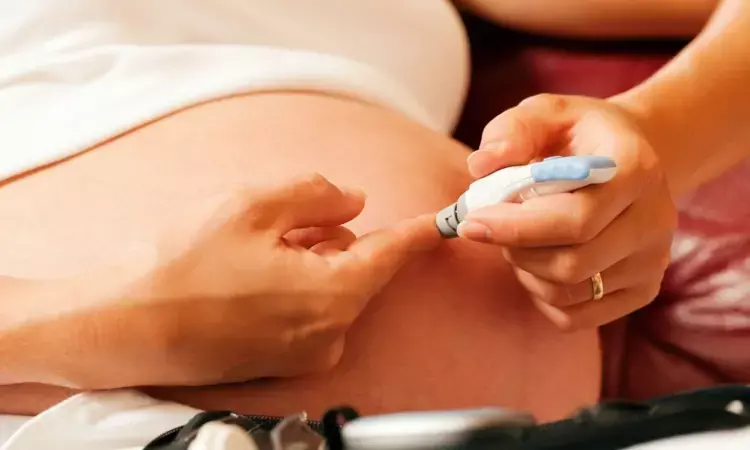- Home
- Medical news & Guidelines
- Anesthesiology
- Cardiology and CTVS
- Critical Care
- Dentistry
- Dermatology
- Diabetes and Endocrinology
- ENT
- Gastroenterology
- Medicine
- Nephrology
- Neurology
- Obstretics-Gynaecology
- Oncology
- Ophthalmology
- Orthopaedics
- Pediatrics-Neonatology
- Psychiatry
- Pulmonology
- Radiology
- Surgery
- Urology
- Laboratory Medicine
- Diet
- Nursing
- Paramedical
- Physiotherapy
- Health news
- Fact Check
- Bone Health Fact Check
- Brain Health Fact Check
- Cancer Related Fact Check
- Child Care Fact Check
- Dental and oral health fact check
- Diabetes and metabolic health fact check
- Diet and Nutrition Fact Check
- Eye and ENT Care Fact Check
- Fitness fact check
- Gut health fact check
- Heart health fact check
- Kidney health fact check
- Medical education fact check
- Men's health fact check
- Respiratory fact check
- Skin and hair care fact check
- Vaccine and Immunization fact check
- Women's health fact check
- AYUSH
- State News
- Andaman and Nicobar Islands
- Andhra Pradesh
- Arunachal Pradesh
- Assam
- Bihar
- Chandigarh
- Chattisgarh
- Dadra and Nagar Haveli
- Daman and Diu
- Delhi
- Goa
- Gujarat
- Haryana
- Himachal Pradesh
- Jammu & Kashmir
- Jharkhand
- Karnataka
- Kerala
- Ladakh
- Lakshadweep
- Madhya Pradesh
- Maharashtra
- Manipur
- Meghalaya
- Mizoram
- Nagaland
- Odisha
- Puducherry
- Punjab
- Rajasthan
- Sikkim
- Tamil Nadu
- Telangana
- Tripura
- Uttar Pradesh
- Uttrakhand
- West Bengal
- Medical Education
- Industry
Higher HbA1c levels in early pregnancy without diabetes tied to increased risk of spontaneous pregnancy loss: Study

China: Findings from a prospective cohort study have shown an association between serum glycated haemoglobin (HbA1c) levels at early gestation and the risk of subsequent pregnancy loss in pregnant women without diabetes mellitus.
The findings published in JMIR Public Health and Surveillance support the need for monitoring HbA1c levels to identify individuals at high risk of subsequent spontaneous pregnancy loss (SPL) in the general population of pregnant women.
Spontaneous pregnancy loss (spontaneous abortion), defined as fetal death occurring before 28 gestational weeks, is one of the serious morbidities during pregnancy and leads to an increased risk of reduced fertility, long-term anxiety, and depression among pregnant women. The aetiology of SPL remains largely unknown. Serum HbA1c level is an established predictor of SPL risk among diabetic women, but not much is known about the existence of an association among pregnant women without diabetes when glycemic levels are within the normal range.
Xiaotian Chen, Children’s Hospital of Fudan University, National Children’s Medical Center, Shanghai, China, and colleagues, therefore, aimed to quantify the association between maternal HbA1c levels in early pregnancy and subsequent risk of spontaneous pregnancy loss in a cohort of pregnant women without diabetes.
The study included 10,773 pregnant women without diabetes enrolled at their first antenatal care visit at a hospital’s early pregnancy clinic from 2016 to 2018 in Shanghai, China. Fasting blood glucose (FBG) and HbA1c levels were examined at enrollment. SPL diagnosis was derived from medical records and confirmed via telephone interviews.
Generalized linear models were used to quantify the associations of continuous and dichotomized maternal HbA1c levels with SPL risk and reported crude and adjusted risk ratios (RRs). The potential nonlinear dose-response relationship was assessed using a restricted cubic spline (RCS) regression model. Adjusted covariates included education level, maternal age, gestational weeks, preconception BMI, history of adverse pregnancy outcomes, gravidity, folic acid supplementation, family history of diabetes, and drinking and smoking during the periconception period.
The study revealed the following findings:
· A total of 273 cases of spontaneous pregnancy loss occurred.
· Every 0.5% increase in HbA1c levels was linearly associated with a 23% increase in SPL risk (adjusted RR [aRR] 1.23). The RCS model revealed that this association was linear.
· Analyses based on dichotomized HbA1c levels showed a significantly increased risk of SPL when HbA1c levels were ≥5.9% (aRR 1.67), and the significance threshold was ≥5.6% (aRR 1.60).
· Sensitivity analyses showed similar results when including the participants with missing SPL records or HbA1c data.
· Linear associations of HbA1c levels remained significant even in the subgroups without alcohol consumption, overweight, and a family history of diabetes and adverse pregnancy outcomes.
· Every 1 mmol/L increment in maternal FBG levels was associated with a >2-fold higher risk of SPL (aRR 2.12).
"In this large prospective cohort study, we provide solid evidence that HbA1c levels in early gestation within the clinically normal range were associated with an increased risk of SPL in a linear dose-response manner among pregnant women without diabetes," the researchers wrote.
"Our findings in a prospective cohort are novel and deepen our understanding of the important pathophysiologic role of impaired maternal glycemic metabolism in the development of spontaneous pregnancy loss," they concluded.
Reference:
Chen X, Zhang Y, Chen H, Dou Y, Wang Y, He W, Ma X, Sheng W, Yan W, Huang G. Association Between Serum Glycated Hemoglobin Levels at Early Gestation and the Risk of Subsequent Pregnancy Loss in Pregnant Women Without Diabetes Mellitus: Prospective Cohort Study/ JMIR Public Health Surveill 2023;9:e46986. URL: https://publichealth.jmir.org/2023/1/e46986. DOI: 10.2196/46986
Dr Kamal Kant Kohli-MBBS, DTCD- a chest specialist with more than 30 years of practice and a flair for writing clinical articles, Dr Kamal Kant Kohli joined Medical Dialogues as a Chief Editor of Medical News. Besides writing articles, as an editor, he proofreads and verifies all the medical content published on Medical Dialogues including those coming from journals, studies,medical conferences,guidelines etc. Email: drkohli@medicaldialogues.in. Contact no. 011-43720751


